
Barcelona is a city on the northeastern coast of Spain. It is the capital and largest city of the autonomous community of Catalonia, as well as the second-most populous municipality of Spain. With a population of 1.6 million within city limits, its urban area extends to numerous neighbouring municipalities within the province of Barcelona and is home to around 5.3 million people, making it the fifth most populous urban area of the European Union after Paris, the Ruhr area, Madrid and Milan. It is one of the largest metropolises on the Mediterranean Sea, located on the coast between the mouths of the rivers Llobregat and Besòs, bounded to the west by the Serra de Collserola mountain range.
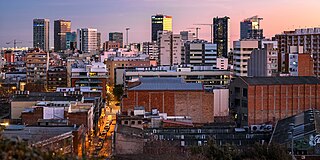
L'Hospitalet de Llobregat, often shortened to L'Hospitalet or just L'H, is a municipality in the Barcelonès comarca, in Catalonia (Spain). It is part of the Barcelona metropolitan area, the Barcelona province, and of the Barcelona conurbation.
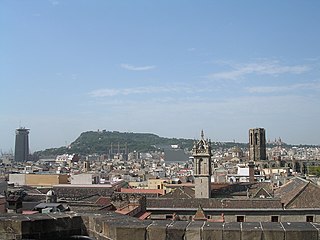
Montjuïc is a hill in Barcelona, Catalonia, Spain.

A cruiseferry is a ship that combines the features of a cruise ship and a Ro-Pax ferry. Many passengers travel with the ships for the cruise experience, staying only a few hours at the destination port or not leaving the ship at all, while others use the ships as means of transportation.
Trasmediterránea operates passengers and cargo ferries between mainland Spain and the Canary Islands, the Balearic Islands, and northern Africa's Spanish territories. Since 2017 the majority of the company belongs to Naviera Armas.
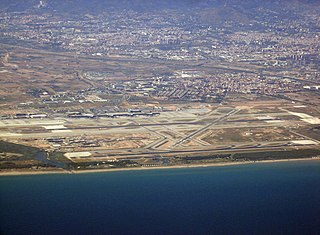
El Prat de Llobregat, commonly known as El Prat, is a municipality of Spain located in the comarca of Baix Llobregat in Catalonia. The Josep Tarradellas Barcelona–El Prat Airport largely lies within the municipal limits. It is part of the Barcelona metropolitan area.
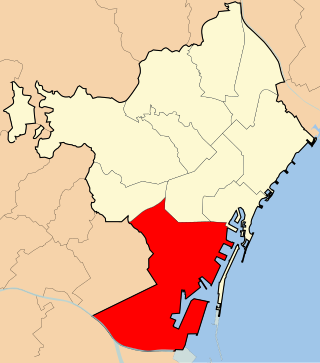
Sants-Montjuïc is one of the ten districts into which Barcelona has been split since 1984, numbered District 3. Comprising very different areas of the city, it covers the southern part of Barcelona, joining the two former districts II and VII, as well as the different areas comprised in the Zona Franca. As of the 2005, census it had a population of 177,636. It borders Les Corts, Eixample, Ciutat Vella, and the municipalities L'Hospitalet de Llobregat and El Prat de Llobregat.

Plaça d'Espanya is one of Barcelona's most important squares, built on the occasion of the 1929 Barcelona International Exposition, held at the foot of Montjuïc, in the Sants-Montjuïc district.
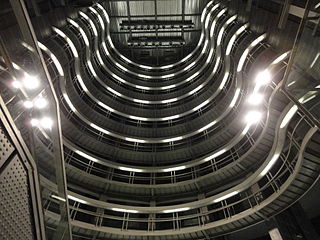
Line 10 is the name of one of the two branches of the Barcelona metro line 9, currently (2020) under construction and to be operated by TMB. Like Line 9 and Line 11, it will be an automatic train operation metro line.

Port Vell is a waterfront harbor in Barcelona, Catalonia, Spain, and part of the Port of Barcelona. It was built as part of an urban renewal program prior to the 1992 Barcelona Olympics. Before this, it was a run-down area of empty warehouses, railroad yards, and factories. 16 million people visit the complex each year.

GNV Blu is a roll-on/roll-off ferry currently operated by Grandi Navi Veloci. She used to be owned by Stena Line and operated on the Karlskrona–Gdynia service. She was built in 1986 by Van der Giessen de Noord as MS Koningin Beatrix for SMZ. In 1989 she passed under Stena Line's ownership and in 2002 was renamed Stena Baltica. In 2013 she was sold to SNAV. On 23 October 2014, SNAV leased the ship to Panamanian company Ferry Xpress Panama to start operations on the Colon – Cartagena – Colon and Colon – Bocas del Toro – Colon routes. Since 2015 the vessel is operated by Trasmediterránea, and is currently used by Grandi Navi Veloci to serve the Bari–Durrës route.

Zona Franca is a logistics and industrial area located in the Sants-Montjuïc district of Barcelona, Catalonia, Spain. Together with the adjacent Port of Barcelona it forms the neighborhood Zona Franca – Port.
Public transport in Barcelona is operated by several companies, most of which are part of the Autoritat del Transport Metropolità, a transport authority managing services in the Barcelonès and the rest of the metropolitan area of Barcelona. This article is a summary with transport facilities and services strictly within the municipality of Barcelona, and contains links to more specific articles.
Zona Franca – Port is an area of Barcelona (Catalonia) in the district of Sants-Montjuïc. The area includes the Polígon Industrial de la Zona Franca and the Port of Barcelona.

The Port Vell Aerial Tramway is an aerial tramway in Barcelona, Catalonia, Spain. It crosses Port Vell, Barcelona's old harbour, connecting the Montjuïc hill with the seaside suburb of Barceloneta.

Grandi Navi Veloci (GNV) is an Italian shipping company, based in Genoa, that operates ferries between mainland Italy, Sicily, Sardinia, France, Spain, Albania, Morocco and Tunisia. It was established by Aldo Grimaldi in 1992.

The following outline is provided as an overview of and topical guide to Barcelona:
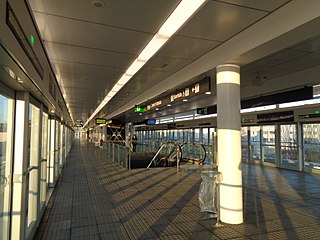
Zona Franca is a Barcelona Metro station located in the Zona Franca neighbourhood of the Barcelona municipality, served by line L10. Until the opening of the Zona Franca-ZAL | Riu Vell section on 7 November 2021, the station was the southern terminus of the Line 10 Sud.

ZAL│Riu Vell is a Barcelona Metro station located in the Zona Franca neighbourhood of the Barcelona municipality, served by line L10. Since its opening, the station is the southern terminus of Line 10 Sud.

The urban planning of Barcelona developed in accordance with the historical and territorial changes of the city, and in line with other defining factors of public space, such as architecture, urban infrastructure and the adaptation and maintenance of natural spaces, parks and gardens.























